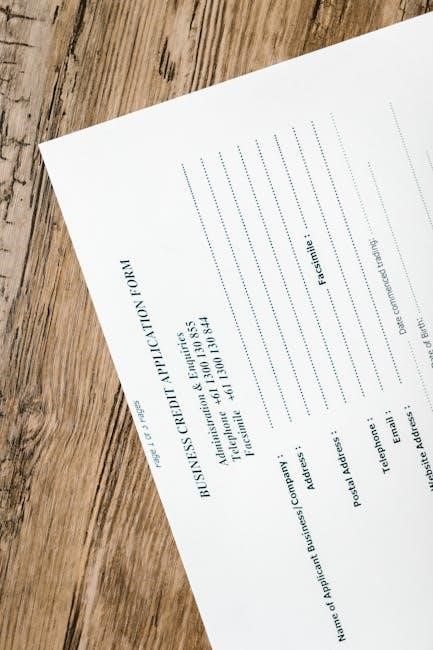Understanding the NJ-COJ Instructions
The NJ-COJ form allows New Jersey residents to claim a tax credit for income taxes paid to other jurisdictions, ensuring they aren’t double-taxed on the same income. It’s crucial for individuals with out-of-state earnings to understand eligibility criteria and proper filing procedures to avoid errors and maximize their credit.

Overview of the NJ-COJ Form and Its Purpose
The NJ-COJ (New Jersey Credit for Taxes Paid to Other Jurisdictions) form is designed to allow New Jersey residents to claim a tax credit for income or wage taxes paid to other states or jurisdictions. This form ensures that individuals are not double-taxed on the same income by both New Jersey and another jurisdiction. It is particularly relevant for those who earn income outside of New Jersey, such as through remote work, multiple jobs, or business activities in other states.
The purpose of the NJ-COJ is to reduce the taxpayer’s New Jersey income tax liability by the amount of taxes paid to other jurisdictions. By completing this form, residents can avoid paying taxes on the same income in both New Jersey and another state, ensuring a fair and equitable tax calculation. The form is straightforward but requires careful attention to detail to ensure accurate reporting of income and taxes paid elsewhere.

- Applies to income taxed by multiple jurisdictions.
- Reduces New Jersey tax liability by the amount of taxes paid elsewhere.
- Essential for residents with out-of-state income sources.
Understanding the NJ-COJ form is vital for anyone with income from outside New Jersey, as it helps prevent double taxation and ensures compliance with state tax laws.

Eligibility Criteria for Claiming the Credit
To be eligible for the NJ-COJ credit, you must meet specific criteria. First, you must be a New Jersey resident who paid income or wage taxes to another jurisdiction on income that is also subject to New Jersey income tax. The income in question must be taxable in both New Jersey and the other jurisdiction. For example, if you earned wages in New York and paid New York state income tax, you may qualify for this credit.
The credit is limited to the amount of New Jersey income tax liability on the same income. You cannot claim a credit for taxes paid on income that is not taxable in New Jersey. Additionally, if you received a refund of taxes paid to another jurisdiction, you may need to adjust your credit claim accordingly.
- You must be a New Jersey resident.
- Income must be taxable in both New Jersey and another jurisdiction.
- Taxes paid to the other jurisdiction must be on the same income.
- Credit cannot exceed New Jersey tax liability on that income.
Understanding these criteria is essential to ensure you qualify for the credit and comply with state tax regulations.

Step-by-Step Guide to Completing Schedule NJ-COJ
Start by identifying the jurisdictions where taxes were paid. Complete a separate Schedule NJ-COJ for each. Calculate the credit using the income taxed in both New Jersey and the other jurisdiction. Ensure accuracy to avoid delays.
Line-by-Line Instructions for Filing the Form
Begin by completing Line 1, which requires the name of the jurisdiction where taxes were paid. On Line 9, enter the amount of income taxable by that jurisdiction. Calculate the credit on Line 10, ensuring it reflects only the income taxed by both New Jersey and the other jurisdiction. For multiple jurisdictions, complete a separate Schedule NJ-COJ for each. When filing, attach all required schedules to your main return. Double-check that the credit claimed does not exceed the tax liability in New Jersey. Properly document all income sources and taxes paid to avoid discrepancies. Ensure all calculations are accurate to prevent delays in processing. If unsure, consult additional resources or seek professional assistance. This step-by-step approach ensures compliance with New Jersey tax regulations and maximizes your eligible credit.
Calculating the Credit for Income Taxes Paid to Other Jurisdictions
To calculate the credit for income taxes paid to other jurisdictions, start by determining the portion of income taxable by both New Jersey and the other jurisdiction. Multiply this income by the tax rate of the other jurisdiction to find the taxes paid. Next, calculate the credit as 66% of the taxes paid to the other jurisdiction, as specified for New Jersey returns. Ensure the credit does not exceed the tax liability in New Jersey for the same income. For example, if you paid $1,000 in taxes to New York, the credit would be $660. Attach Schedule NJ-COJ to your return, listing the jurisdiction, income, and taxes paid. If income is taxed by multiple jurisdictions, complete a separate schedule for each. Double-check calculations to avoid errors and ensure compliance with state tax regulations.

Special Considerations and Considerations
Special considerations include handling multiple jurisdictions, ensuring accurate income allocation, and avoiding double taxation. Separate schedules may be required for each jurisdiction, and taxpayers must verify eligibility for credits to prevent errors and ensure compliance with state tax regulations.
Handling Multiple Jurisdictions and Complex Filings
When dealing with multiple jurisdictions, taxpayers must complete a separate Schedule NJ-COJ for each state or locality where income was earned and taxed. This ensures accurate allocation of income and prevents double taxation. For complex filings, it’s essential to carefully review each jurisdiction’s tax laws and verify the correct credit calculations. Taxpayers should also maintain detailed records of income and taxes paid in each jurisdiction to support their claims. Additionally, individuals with income from multiple jurisdictions may need to consult tax professionals to navigate intricate filing requirements and ensure compliance with New Jersey state tax regulations. Proper organization and attention to detail are crucial to avoid errors and maximize eligible credits. By adhering to these guidelines, taxpayers can efficiently manage their obligations and optimize their tax positions across multiple jurisdictions.
Common Mistakes and How to Avoid Them
One of the most common mistakes when filing Schedule NJ-COJ is incorrectly allocating income across multiple jurisdictions, leading to inaccurate credit calculations. Taxpayers often miscalculate the credit by failing to account for differences in tax rates or income thresholds between jurisdictions. Additionally, some individuals forget to file separate NJ-COJ forms for each jurisdiction, resulting in missed credits. Another error is not properly documenting income and taxes paid to other jurisdictions, which can delay refunds or lead to audits. To avoid these issues, taxpayers should carefully review their income statements and ensure accurate allocation. Double-checking calculations and maintaining detailed records is essential. Filing separate forms for each jurisdiction and adhering to deadlines can prevent errors. Consulting tax professionals or using tax software can also help mitigate mistakes. By being meticulous and organized, taxpayers can ensure compliance and maximize their eligible credits.

Important Deadlines and Documentation

Ensure timely filing of Schedule NJ-COJ with your New Jersey tax return by the annual deadline, typically April 15th. Maintain detailed documentation, including W-2s and 1099s, to support income and tax claims for accurate processing.
Key Dates for Submitting Schedule NJ-COJ
The deadline for submitting Schedule NJ-COJ is typically April 15th of each year, aligning with the New Jersey state income tax return filing deadline. However, if you file for an extension, the deadline may be extended to October 15th. Ensure all required documentation, such as W-2s, 1099s, and proof of taxes paid to other jurisdictions, is included with your submission. Missing the deadline may result in delayed processing or loss of the credit. For tax year 2023, the IRS and New Jersey tax authorities have not announced any changes to these dates. Properly filing by the deadline ensures timely processing of your return and prevents potential penalties. Always verify the most current filing dates on the New Jersey Division of Taxation website before submitting your return.
